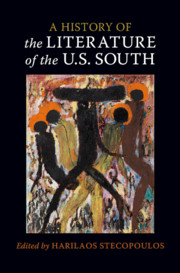Book contents
- A History of the Literature of the U.S. South
- A History of the Literature of the U.S. South
- Copyright page
- Contents
- Contributors
- Acknowledgements
- Introduction
- Chapter 1 Fictions of the Native South
- Chapter 2 John Smith and the English Origins of Southern Exceptionalism
- Chapter 3 Plantation and Enlightenment
- Chapter 4 Geoconfederacy
- Chapter 5 In the Shadow of His Office
- Chapter 6 Shadows of Haiti
- Chapter 7 “Midnight Bakings” Amid Starvation
- Chapter 8 A Calculated Fiction
- Chapter 9 Maroons and Marronage in Antebellum African American Literature
- Chapter 10 Everyday Literary Culture in the Nineteenth Century
- Chapter 11 Fables of the Bloody Shirt
- Chapter 12 A Heritage Unique in the Ages
- Chapter 13 Moonlight and Magnolias No More
- Chapter 14 Women Writers and the Southern Renaissance; or, the Work of Gender in Literary Periodization
- Chapter 15 Southern Geographies and New Negro Modernism
- Chapter 16 “A fine loud grabble and snatch of AAA and WPA”
- Chapter 17 Provincialism as a Positive Good
- Chapter 18 Faulkner’s Untimely Fiction
- Chapter 19 Reconsidering Du Bois’s “Central Text”
- Chapter 20 Cultural Activism and Theater of the Civil Rights Movement
- Chapter 21 Till the Hurt Becomes Music
- Chapter 22 Undead Sound
- Chapter 23 There Is No South
- Chapter 24 Hurricane Alley
- Select Bibliography
- Index
Chapter 19 - Reconsidering Du Bois’s “Central Text”
W. E. B. Du Bois, Sarah Wright, and the Problem of the “Black Worker”
Published online by Cambridge University Press: 29 April 2021
- A History of the Literature of the U.S. South
- A History of the Literature of the U.S. South
- Copyright page
- Contents
- Contributors
- Acknowledgements
- Introduction
- Chapter 1 Fictions of the Native South
- Chapter 2 John Smith and the English Origins of Southern Exceptionalism
- Chapter 3 Plantation and Enlightenment
- Chapter 4 Geoconfederacy
- Chapter 5 In the Shadow of His Office
- Chapter 6 Shadows of Haiti
- Chapter 7 “Midnight Bakings” Amid Starvation
- Chapter 8 A Calculated Fiction
- Chapter 9 Maroons and Marronage in Antebellum African American Literature
- Chapter 10 Everyday Literary Culture in the Nineteenth Century
- Chapter 11 Fables of the Bloody Shirt
- Chapter 12 A Heritage Unique in the Ages
- Chapter 13 Moonlight and Magnolias No More
- Chapter 14 Women Writers and the Southern Renaissance; or, the Work of Gender in Literary Periodization
- Chapter 15 Southern Geographies and New Negro Modernism
- Chapter 16 “A fine loud grabble and snatch of AAA and WPA”
- Chapter 17 Provincialism as a Positive Good
- Chapter 18 Faulkner’s Untimely Fiction
- Chapter 19 Reconsidering Du Bois’s “Central Text”
- Chapter 20 Cultural Activism and Theater of the Civil Rights Movement
- Chapter 21 Till the Hurt Becomes Music
- Chapter 22 Undead Sound
- Chapter 23 There Is No South
- Chapter 24 Hurricane Alley
- Select Bibliography
- Index
Summary
This chapter calls upon both black southern feminist and indigenous critiques to wrestle with the legacy of Du Bois's black slave-as-worker thesis. Without discounting the world-historical value of Du Bois’s revision of Marx’s universal subject, this chapter puts pressure on the analytic dominance associated with the productive labor of the dark proletariat by asking the following question: what would happen to the future potentialities of the black radical tradition if we reassessed black radical historiography and its genealogies of resistance through the subjugated knowledges of southern black and indigenous women? Arguing for a reassessment of the revolutionary analytic of labor drawn from those whose subject positions remain peripheral to Du Bois’s imagined solidarity among the “basic majority of workers who are yellow, brown, and white,” this chapter examines a subversive black southern-inter/nationalist feminist literary tradition that troubles the emancipatory claims drawn from the now normative coupling of “blackness and labor” in order to activate futures that are unrealizable in the current terms of order.
Keywords
- Type
- Chapter
- Information
- A History of the Literature of the U.S. South , pp. 313 - 327Publisher: Cambridge University PressPrint publication year: 2021

